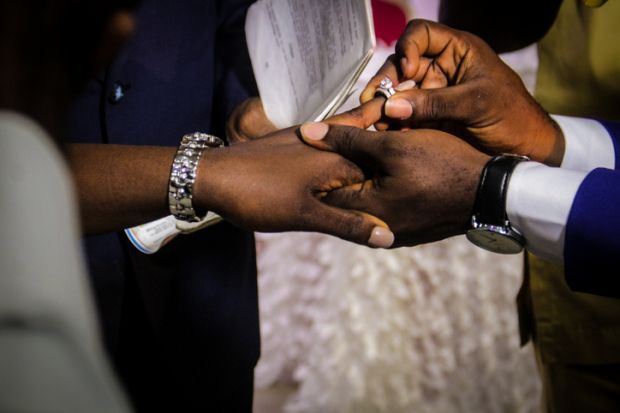Students at a Nigerian university are embracing lessons on how to have a happy marriage, its vice-chancellor has insisted.
“They look forward to these sessions,” said Covenant University’s Abiodun Adebayo of his undergraduates’ enthusiasm for the marriage advice classes, which are part of a mandatory module on personal development.
“We look at how to get a life partner and how to behave well in a marriage, even how to get engaged,” said Professor Adebayo, who was a speaker at Times Higher Education’s inaugural Pan-Africa Universities Summit, which is taking place in South Africa at the University of Pretoria, in association with Stellenbosch University.
“We’ll look at successful marriages to see what people are doing right but also those that have crashed, and consider why this happened,” he added.
The marriage advice classes are part of the Pentecostal Christian university’s “Total Man Concept” towards educating students, in which spiritual and personal development are encouraged alongside academic excellence, said Professor Adebayo.
“It’s a very radical – we are trying to reform and rebrand higher education…to make the ‘total man’,” he told THE. Education is about the “spiritual self and the body” as well as intellectual development, he added.
To this end, the university now requires all students to undertake a leadership diploma before they graduate, while entrepreneurship is also “embedded in the curriculum”, which means students will have “real-life, real-time experience in industry” before they leave, explained Professor Adebayo, who has led Covenant University since 2020.
The institution – whose chancellor is the influential preacher David Olaniyi Oyedepo, president of the Living Faith Church Worldwide network, which has churches in more than 250 cities and towns in Nigeria, including the 50,000-seat Faith Tabernacle auditorium – is one of country’s most highly regarded universities. It ranked joint first for Nigeria in THE’s latest World University Rankings alongside the University of Ibadan, the country’s first university.
Covenant has, however, courted controversy for its strict rules in which male students are required to wear shirts and ties to lectures and exams, while female students are told to dress in a similar “corporate” style to class. A detailed dress code stipulates that “overclinging clothing” and “revealing blouses” are also banned in class. Jeans, chinos and corduroy trousers are banned on campus.
Unusually, Covenant has also banned students from having mobile phones and SIM-activated tablets on campus on the ground that these devices are a distraction.
“We have been very intentional since we were established in 2002,” Professor Adebayo told the THE summit.
“Our vision is to raise the next generation of leaders in Nigeria…and we have a very strong sense of what students must not do, but also what they must do…Students at Covenant will not do what they like but what is right. If they go outside this, they must face a [disciplinary] panel,” he added.
While the university was clear about its commitment to moral improvement, providing a more holistic education to students – including professional and personal development modules – was also vital given the huge competition for graduate jobs in Africa, added Professor Adebayo.
“About 10 to 12 million graduates are being turned out every year on this continent with only about three million available jobs – what becomes of the rest?” he asked.
That was why “whatever degree a student chooses, they must have a diploma in leadership and entrepreneurship is embedded in the curriculum”, he said.




